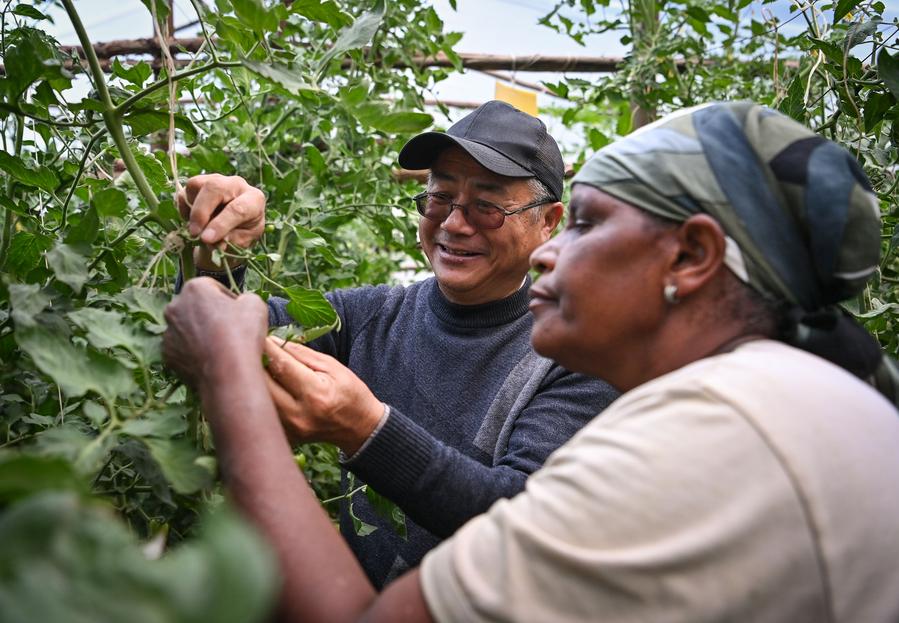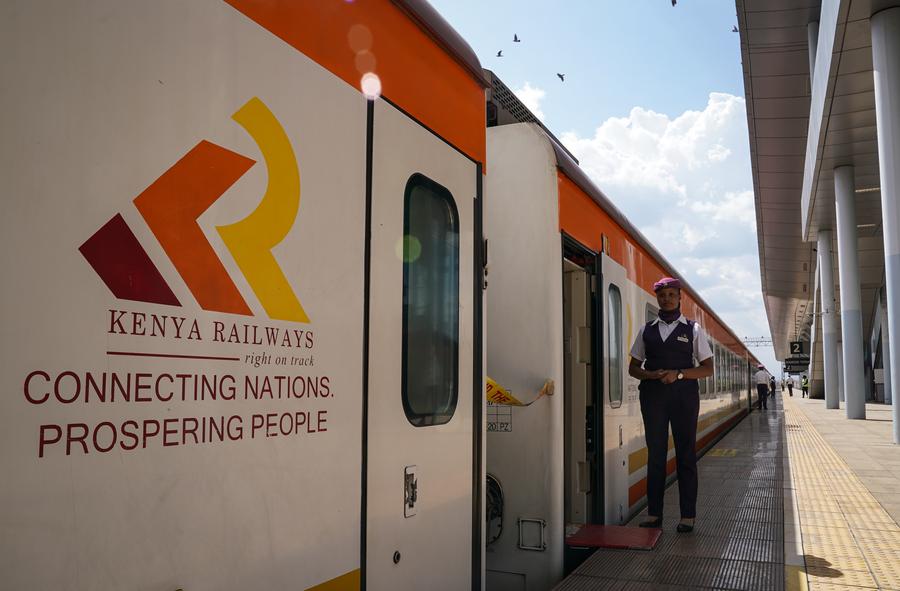
 Liu Gaoqiong (L), a professor of Horticulture from Nanjing Agricultural University, also a visiting professor at Egerton University, gives guidance to Mary Mwangi, a local farmer, on the field management of grafted tomatoes on a farm in Nakuru County, Kenya, Oct. 23, 2024. (Xinhua/Han Xu)
Liu Gaoqiong (L), a professor of Horticulture from Nanjing Agricultural University, also a visiting professor at Egerton University, gives guidance to Mary Mwangi, a local farmer, on the field management of grafted tomatoes on a farm in Nakuru County, Kenya, Oct. 23, 2024. (Xinhua/Han Xu)
For centuries, China and Kenya have shared a history of exchanges and cooperation.
Last week, their relationship entered a new stage as Chinese President Xi Jinping held talks with Kenyan President William Ruto in Beijing, agreeing to elevate bilateral ties to a China-Kenya community with a shared future in the new era.
Xi called on the two sides to enhance regular policy communication, build connectivity at a higher level, promote sustainable trade, explore diversified financial integration, carry forward the friendship forged through generations, and be leaders in advancing high-quality Belt and Road cooperation.
SKILLS TRAINING
Linet Wambui Kihoro, a 27-year-old railway safety engineer, works among tracks and equipment at the Mombasa-Nairobi Standard Gauge Railway, a flagship project under the Belt and Road Initiative.
A graduate of Beijing Jiaotong University, Kihoro now applies her expertise to maintain the daily operation of Kenya's railways.
In January 2024, Xi replied to a letter from Kenyan students and alumni of Beijing Jiaotong University, including Kihoro.
President Xi encouraged the Kenyan students to learn professional knowledge well, continue the traditional friendship, and devote themselves to bilateral cooperation, she said.
"The China-Kenya community with a shared future in the new era is not only a cooperation intention at the governmental level but is also reflected in various aspects such as people-to-people connectivity, youth exchanges, and cultural mutual learning," she said.
According to a joint statement released on Thursday, China and Kenya pledged to strengthen cooperation in such areas as industry, agriculture, higher education, vocational education, and human resource training.
An increasing number of young people, like Kihoro, are benefiting from China-Africa cooperation in education and capacity building.
From the Mombasa-Nairobi Railway to the Swak Dam, the Nairobi Expressway, and the Garissa Solar Power Plant, high-quality Belt and Road projects have not only improved the daily lives of Kenyans but also provided opportunities to learn new skills and knowledge.
James Karimi Njuguna, a Kenyan engineer, participated in the upgrading of the Olkaria I power plant, Africa's first geothermal plant, which had been struggling with corroded pipelines and outdated technology.
"Chinese companies revitalised the geothermal fields by optimizing turbine structures and well layouts," Njuguna said. "It was a technological revolution. They modernized the equipment, hired local employees and provided professional training, cultivating a new generation of technical experts in Kenya."
 A stewardess stands next to the train to Mombasa at Nairobi Terminus Station of the China built Mombasa-Nairobi Standard Gauge Railway (SGR) in Nairobi, Kenya, Sept. 20, 2023. (Xinhua/Han Xu)
A stewardess stands next to the train to Mombasa at Nairobi Terminus Station of the China built Mombasa-Nairobi Standard Gauge Railway (SGR) in Nairobi, Kenya, Sept. 20, 2023. (Xinhua/Han Xu)
This not only increased local employment but also contributed to transforming the technological landscape.
AGRICULTURAL COOPERATION
In Matangi Tisa Village in Kenya's Nakuru County, home to Kenya's first demonstration village for China-Africa agricultural development and poverty reduction, people are busy planting tomatoes with the help of Chinese experts.
For years, local tomato farming had been plagued by bacterial wilt, but villagers are hopeful of a bountiful harvest this season.
When the Chinese and Kenyan presidents met during the Summit of the Forum on China-Africa Cooperation (FOCAC) held in Beijing last year, Xi said "the two sides should closely synergize the high-quality Belt and Road cooperation with Kenya Vision 2030, build an East African connectivity hub and industrial belt, and strengthen cooperation in such areas as digital economy, new energy, economy, trade, poverty reduction and agriculture development."
Among the 10 partnership actions announced by Xi at the 2024 FOCAC Summit is the partnership action for agriculture and livelihoods.
Under this initiative, China has committed to building 100,000 mu (about 6,670 hectares) of standardized agricultural demonstration areas, sending 500 agricultural experts, and establishing a China-Africa agricultural science and technology innovation alliance.
These commitments are injecting fresh momentum into Africa's efforts toward agricultural modernization and poverty alleviation.
In a recent interview with Xinhua, President Ruto praised China's success in lifting hundreds of millions of people out of poverty, calling China's experience highly relevant for African countries still grappling with poverty.
He expressed hope to leverage Chinese expertise to advance Kenya's agricultural modernisation and industrialisation.
In Kenya's Siaya County, 69-year-old farmer Peter Onyango was watching the clear waters flow through newly dug irrigation channels, eagerly anticipating a good harvest.
Built by a Chinese company along the lower reaches of the Nzoia River, this irrigation project, the largest of its kind in Kenya, has significantly boosted local irrigation capacity.
Officially operational in April, the canal is expected to enhance food security.
When visiting the project in January, Ruto said that the new infrastructure would play a major role in advancing Kenya's economic transformation by boosting agricultural productivity.
STRENGTHENING ECONOMIC TIES
Rains in April have breathed new life into the rolling tea plantations of western Kenya. Near the C22 highway built by a Chinese company, several tea processing factories are working at full speed.
A few years ago, the road was little more than a muddy dirt track, often becoming impassable during the rainy season.
"Truck wheels would get stuck, and sometimes water would seep into the tea boxes, ruining the harvest," recalled driver John Murambi.
Since the road was upgraded to a paved highway, Murambi can now make multiple deliveries a day, which has greatly increased his income. "We no longer have to worry about tea spoiling on the road," he said.
At the nearby Kipkebe Tea Factory, General Manager Silas Njibwakale said that since the completion of the road upgrading, transportation losses have dropped from about a quarter of total production to nearly zero.
A once-impassable route has now become a major artery supporting local communities.
Across Kenya, Chinese-built roads, railways, and ports are helping break transportation bottlenecks for key exports like tea, coffee, flowers, and avocados, allowing these goods to reach global markets more quickly and reliably.
Thousands of miles away in Changsha, central China, the permanent exhibition hall of the China-Africa Economic and Trade Expo at Gaoqiao Grand Market is bustling with visitors.
Launched by President Xi during the 2018 FOCAC Beijing Summit, the expo has become a vital platform showcasing African goods.
Huang Zinan, who specializes in China-Africa trade, said her company has recently imported a batch of Kenyan avocados and is now negotiating with a local tea brand to feature the fruit as a premium ingredient. Initially focused on Kenyan flowers, she now plans to expand her business to more "African treasures."
"Products from Africa are gaining increasing recognition and popularity in China," Huang said.
"I hope to build not just a trade bridge, but also a bridge of culture and friendship across the seas."
Through something as simple as an avocado or a fresh flower, she hopes to tell the story of win-win cooperation between China, Kenya, and the wider African continent.







![[PHOTOS] Guardian Angel bus catches fire in Kikuyu](/_next/image?url=https%3A%2F%2Fcdn.radioafrica.digital%2Fimage%2F2025%2F04%2F58287f0a-f201-4a78-87f0-6f147ad8ba8a.jpg&w=3840&q=100)




